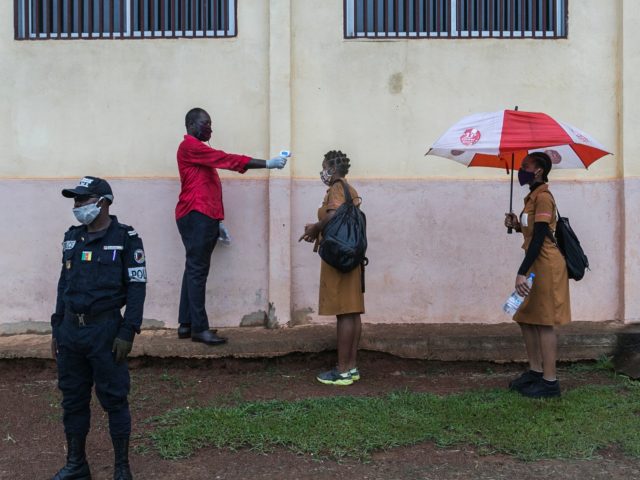Scientists from IHU Mediterranee Infection, a leading French institute of infectious disease microbiology, published a research paper this week describing another new variant of the Wuhan coronavirus.
he paper suggested the variant originated in the African nation of Cameroon – an implication Cameroon’s health minister rejected on Wednesday.
Dr. Manaouda Malachie, the Cameroonian health minister, released a statement that challenged the French paper and its conclusions.
“This information comes from an approximate summary of a “pre-print” type document – that is, a presentation of unvalidated scientific data,” Malachie said. “The preliminary analysis of the data presented shows major shortcomings in the methodological approach leading to the resulting assertions. As a result, these documents have at this stage no scientific evidence status.”
Malachie noted the small sample size of just eight patients in the report, arguing this was not enough data to even conclude a new Chinese coronavirus variant had been identified, let alone where it came from:
Only one of the eight cases is presented as having made a trip to Cameroon without the chronology of events making it possible to establish a relationship between said trip and the alleged infection. Moreover, no chronological sequence of infections of the eight patients is presented, nor any element of contact analysis allowing the person who traveled to Cameroon to be considered as an index case.
The Cameroonian health minister said the French report bordered on “a simple stigmatization of our country.” He added it was “regrettable” that the authors did not reach out to his ministry for information, and accused the authors of seeking “buzz” for discovering a new variant.
Malachie also expressed concerns that unvalidated assertions of a new coronavirus variant originating in Cameroon could hurt attendance for the African National Championship soccer game to be held there in early February.
The new strain, formally designated B.1.640.2 but nicknamed the “IHU variant” after the institute, was first detected in southeastern France in November but supposedly originated in the West African nation of Cameroon.
Patient Zero for the outbreak was described in the paper as an unidentified individual who spent three days in Cameroon, then returned home to a small town in France, where the infection spread to 12 more people.
“These observations show once again the unpredictability of the emergence of new SARS-CoV-2 variants and their introduction from abroad, and they exemplify the difficulty to control such introduction and subsequent spread,” the authors wrote.
The small number of patients made it difficult for researchers to determine if the IHU variant is more contagious or more dangerous than the basic Chinese coronavirus virus or much-discussed variants like delta and omicron.

A general view of a vaccination centre as a man registers before receiving his Covid-19 vaccine at a vaccination centre in Yaounde, Cameroon, on November 29, 2021. Cameroon, one of the sub-Saharan African countries most affected by Covid-19, with more than 107,000 infections, including 1,795 deaths, preconceived ideas and misinformation on social networks holding back the vaccination campaign. (DANIEL BELOUMOU OLOMO/AFP via Getty)
The original patient, fully vaccinated before contracting the disease, reportedly suffered from “mild respiratory symptoms.”
Deutsche Welle (DW) on Tuesday quoted Jorg Timm, head of the virology institute at University Hospital Dusseldorf, predicting the IHU variant will not cause “truly significant problems,” since it “hasn’t become prominent in areas where a lot of sequencing is being done.”
The World Health Organization (W.H.O.) apparently concurs, as it has not declared IHU a “variant of interest” or “variant of concern.”
At a press conference in Geneva on Tuesday, W.H.O. said the variant identified in France has “been on our radar” since before Omicron made headlines, and does not appear to have grown into a more serious threat despite having “had a lot of chances to pick up.”
Some virologists hypothesized the IHU variant was essentially crushed by omicron, since it was first detected before omicron but has not spread nearly as widely or quickly. To date, the only confirmed cases of IHU transmission occurred in southern France, which makes the Cameroon connection somewhat tenuous.
France reported a record-breaking 271,686 coronavirus cases on Tuesday, a surge largely attributed to the highly contagious, vaccine-resistant Omicron variant. France’s case numbers doubled every day during the final week of 2021, leaving it with the highest number of active cases in Europe.
Africans responded angrily to travel bans hastily imposed by U.S. President Joe Biden and other Western leaders during the Omicron outbreak in November, accusing them of unfairly scapegoating Africa as the source of Omicron when it was merely isolated and classified by doctors in Botswana and South Africa. South Africa was especially bitter about being “punished, instead of applauded” for isolating Omicron, as the Foreign Ministry put it.
In late November, Dutch researchers announced finding the Omicron variant in clusters that were spreading through western Europe days before Omicron cases were confirmed in South Africa.

COMMENTS
Please let us know if you're having issues with commenting.